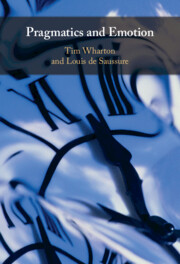Book contents
- Pragmatics and Emotion
- Pragmatics and Emotion
- Copyright page
- Dedication
- Contents
- Acknowledgements
- 1 Introduction
- 2 Pragmatics and Emotion
- 3 What Is Emotion?
- 4 From Proto-pragmatics to Pragmatics
- 5 Relevance Theory, Non-propositional Content and Ineffability
- 6 Beyond Propositions
- 7 Emotion and Evolution
- 8 Pragmatics and Emotion
- References
- Index
7 - Emotion and Evolution
Published online by Cambridge University Press: 13 December 2023
- Pragmatics and Emotion
- Pragmatics and Emotion
- Copyright page
- Dedication
- Contents
- Acknowledgements
- 1 Introduction
- 2 Pragmatics and Emotion
- 3 What Is Emotion?
- 4 From Proto-pragmatics to Pragmatics
- 5 Relevance Theory, Non-propositional Content and Ineffability
- 6 Beyond Propositions
- 7 Emotion and Evolution
- 8 Pragmatics and Emotion
- References
- Index
Summary
Chapter 7 broadens the discussion by exploring pragmatics and emotion from an evolutionary perspective (see Cornell and Wharton 2021). We suggest that in modern-day humans, two systems of processing and communication co-exist: one evolutionarily ancient and to which affective effects are more closely related, the other evolutionarily more recent, and in which conceptual, propositional processes - and cognitive effects - tend to dominate. We illustrate how two such systems work with reference to an underexplored paper by Paul Grice in which he outlines his ‘creature-construction’ thought experiment. One of the main claims of this book is that in focusing exclusively on propositional inference, the low, fast route has been ignored. The existence of these two routes might shed light on how the emotional vigilance presented in Dezecache et al. (2013) may make use of both the specialised inferential and coding-decoding mechanisms and may even represent a precursor to those strategies that underlie epistemic vigilance.
- Type
- Chapter
- Information
- Pragmatics and Emotion , pp. 126 - 143Publisher: Cambridge University PressPrint publication year: 2023

